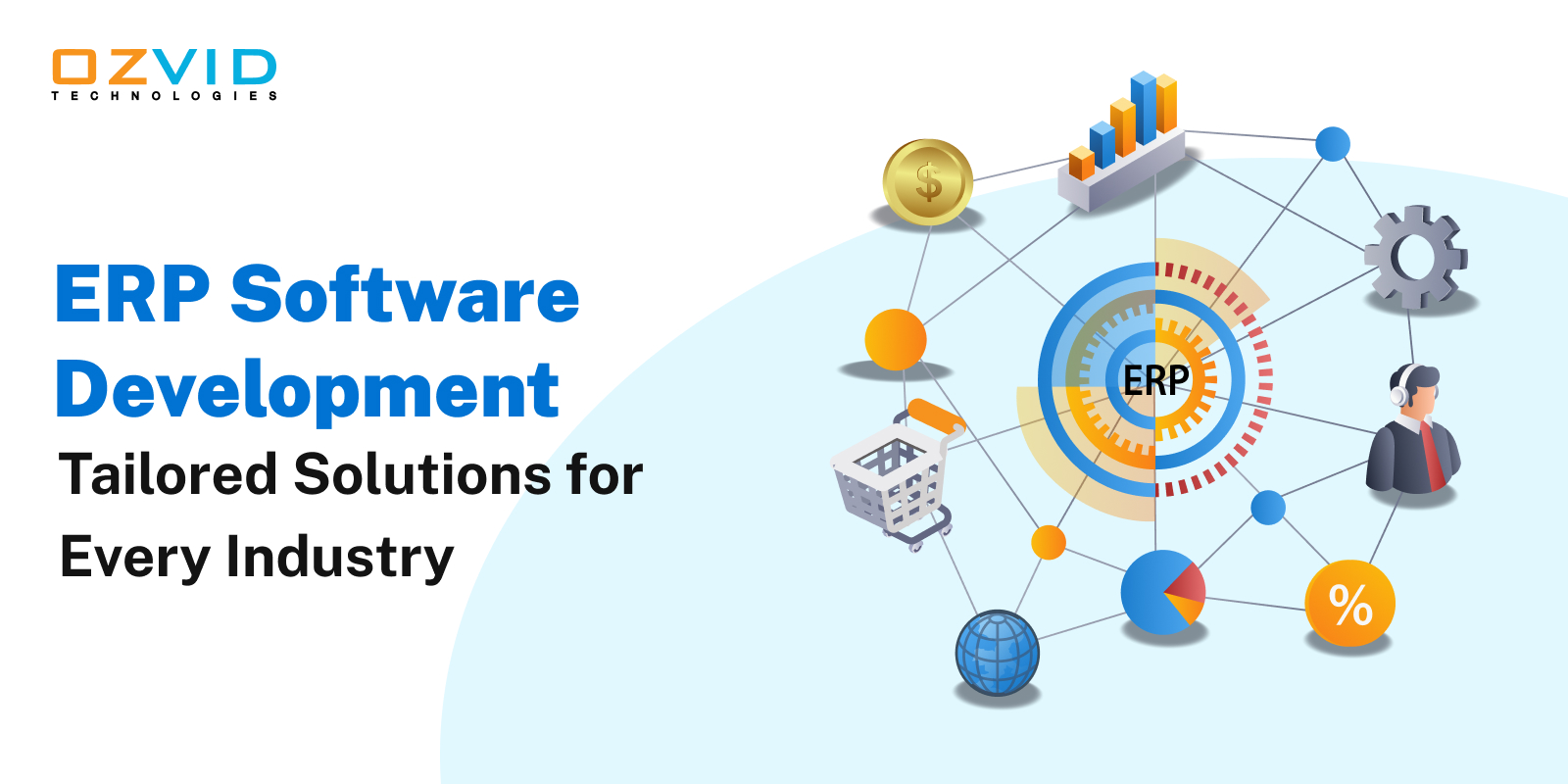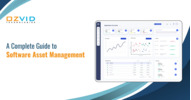- Feb 14, 2025
- Web Development
- 2445
Share this post on:

Enterprise Resource Planning (ERP) systems have become a cornerstone of modern business operations. From small startups to large enterprises, ERP software helps streamline business processes, improve efficiency, and provide real-time data to aid decision-making. However, the one-size-fits-all approach to ERP is rapidly becoming obsolete. As industries evolve and face unique challenges, the need for tailored ERP software has never been greater. Custom ERP solutions are designed to meet the specific needs of individual businesses, ensuring that they can maximize their operational potential and stay competitive in a dynamic marketplace.
In this blog, we will explore the importance of ERP software development, the benefits of tailored solutions for different industries, and how businesses can leverage these solutions to achieve their goals. We will also highlight the role of companies like OZVID Technologies in helping businesses implement customized ERP systems that drive growth, improve efficiency, and enhance decision-making.
Key Takeaways:
Custom ERP Solutions: Tailored ERP systems address industry-specific needs, enhancing efficiency and scalability.
Industry-Specific Features: Healthcare, manufacturing, retail, construction, and finance benefit from specialized ERP functionalities.
Improved Decision-Making: Real-time data and custom dashboards enable informed, actionable insights
Cost-Effectiveness: Custom ERP systems reduce long-term costs by eliminating unnecessary features and third-party add-ons.
Integration & Flexibility: Seamless integration with existing systems and scalability ensure adaptability to business growth.
Understanding ERP Software
Enterprise Resource Planning (ERP) refers to a suite of integrated applications designed to manage various business functions within an organization, such as accounting, inventory, procurement, human resources, sales, and customer relationship management. ERP systems are designed to centralize data, making it easily accessible across the organization and providing a unified view of operations.
Traditional ERP solutions were often monolithic and rigid, requiring businesses to adapt their processes to the software. However, modern ERP software development has moved towards more flexible and customizable solutions that can be tailored to meet the unique needs of individual businesses and industries.
The core functionalities of ERP systems include:
- Finance and Accounting: Managing financial transactions, budgeting, and reporting.
- Supply Chain and Inventory Management: Tracking and managing inventory, procurement, and logistics.
- Human Resources (HR): Handling employee records, payroll, performance management, and recruitment.
- Customer Relationship Management (CRM): Managing customer interactions, sales, and marketing efforts.
- Manufacturing and Production: Optimizing production schedules, resource planning, and quality control.
While these functions are common to most organizations, the way they are executed can vary significantly between industries. This is where the need for tailored ERP software development becomes apparent.
Why Tailored ERP Software is Essential
Every industry has its unique challenges, workflows, and regulatory requirements. Generic ERP systems often fail to meet the specific needs of different sectors, leading to inefficiencies, increased costs, and a lack of alignment with business goals. Tailored ERP software solutions are developed with a deep understanding of industry-specific requirements, allowing businesses to optimize their processes and achieve better results.
Here are some reasons why customized ERP solutions are essential for businesses:
1. Industry-Specific Requirements
Each industry has its own set of needs, processes, and compliance regulations. For example, the healthcare industry requires robust patient management and regulatory compliance features, while the retail sector focuses on inventory tracking and customer service. A tailored ERP solution ensures that the software meets the unique demands of the industry, providing relevant features and functionalities.
For example:
- Healthcare: Custom ERP solutions in healthcare can integrate with Electronic Health Records (EHR) systems, track patient visits, manage billing and insurance claims, and ensure HIPAA compliance.
- Manufacturing: Manufacturers may need features such as production scheduling, quality control, and supply chain management, which are not typically included in off-the-shelf ERP software.
2. Scalability and Flexibility
As businesses grow, their needs evolve. A tailored ERP solution can be designed to scale with the organization, adding new modules or features as required. Custom ERP systems allow businesses to remain agile and flexible, making it easier to adjust to new market conditions or internal changes.
For example, an e-commerce company may start with a small catalog but need to scale its ERP system to handle a larger product range, manage high-volume transactions, and integrate with third-party logistics providers as it expands.
3. Integration with Existing Systems
Many businesses already use specialized software to handle specific functions, such as Customer Relationship Management (CRM) systems, accounting tools, or inventory management software. A customized ERP solution can integrate seamlessly with these existing systems, ensuring data consistency and eliminating the need for manual data entry or duplicate systems.
For instance, a logistics company may use a separate tracking system for shipments. A tailored ERP solution can integrate this tracking system with the core ERP platform, enabling real-time updates and greater visibility into the supply chain.
4. Improved Efficiency and Productivity
Tailored ERP software is designed with the specific needs of a business in mind, eliminating unnecessary features that can slow down operations. By automating workflows and providing tools that align with business processes, custom ERP systems enhance productivity and efficiency.
For example, an inventory management system tailored to a retail business can automate stock replenishment, track product movement across different locations, and generate purchase orders automatically based on pre-set thresholds, saving time and reducing the risk of human error.
5. Better Decision-Making
One of the key advantages of ERP software is its ability to provide real-time data for decision-making. A tailored ERP system takes this a step further by offering reports and insights specific to the needs of the business. Custom dashboards, key performance indicators (KPIs), and data visualizations provide actionable insights that empower business leaders to make informed decisions.
For example, a restaurant chain can use a custom ERP system to monitor sales performance, inventory levels, and customer feedback across multiple locations. With this data, managers can make real-time decisions about menu changes, pricing, and staffing levels.
6. Cost-Effectiveness in the Long Run
While off-the-shelf ERP systems may appear cheaper upfront, they often come with hidden costs such as customization expenses, additional software licenses, and training costs. Custom ERP solutions, though initially more expensive, provide long-term cost savings by eliminating the need for expensive third-party add-ons and reducing the risk of inefficiencies caused by poorly aligned software.
Industry-Specific ERP Solutions
Tailored ERP systems are becoming increasingly popular across various industries. Below are some examples of how ERP solutions are customized for specific sectors:
1. Manufacturing
In the manufacturing industry, ERP software plays a vital role in production planning, inventory control, and quality management. A tailored ERP solution for manufacturing companies can help streamline operations by providing features such as:
- Production Scheduling: Ensuring that manufacturing processes run efficiently by scheduling production runs based on demand.
- Inventory Management: Tracking raw materials, work-in-progress inventory, and finished goods in real-time to reduce waste and ensure optimal stock levels.
- Supply Chain Optimization: Managing the entire supply chain, from procurement to distribution, to ensure timely deliveries and minimize stockouts.
Manufacturers can also benefit from integrated maintenance management modules that track equipment performance and schedule preventive maintenance to avoid costly downtime.
2. Healthcare
Healthcare organizations, including hospitals, clinics, and insurance providers, require ERP systems that comply with industry regulations and improve patient care. A custom ERP system in healthcare can include features such as:
- Patient Management: Tracking patient information, appointments, medical histories, and treatment plans to enhance care delivery.
- Billing and Insurance Integration: Handling complex billing procedures and ensuring that claims are processed efficiently and accurately.
- Regulatory Compliance: Ensuring that the system complies with regulations like HIPAA and supports secure data storage and management.
Tailored healthcare ERP solutions improve administrative efficiency, reduce errors, and allow healthcare providers to focus on delivering high-quality care.
3. Retail and E-Commerce
Retailers and e-commerce businesses require ERP systems that manage inventory, track customer orders, and integrate with various sales channels. A tailored ERP solution for retail can include:
- Inventory Management: Automatically tracking inventory levels, product movement, and stock replenishment to avoid stockouts.
- Point of Sale (POS) Integration: Synchronizing data between physical stores and online platforms to provide a unified view of sales and inventory.
- Customer Relationship Management (CRM): Analyzing customer data to improve personalized marketing efforts, loyalty programs, and customer service.
Custom ERP solutions allow retailers to improve order fulfillment, enhance the customer experience, and better manage supply chains.
4. Construction
Construction companies face complex challenges related to project management, budgeting, and resource allocation. A tailored ERP system for construction companies can address these needs by offering:
- Project Management: Tracking project progress, deadlines, and budgets to ensure projects are completed on time and within budget.
- Resource Allocation: Managing labor, equipment, and materials efficiently to avoid delays and reduce costs.
- Contract Management: Handling contracts, change orders, and compliance with regulations to avoid legal and financial risks.
Custom ERP solutions in construction improve project visibility, reduce operational costs, and enhance project delivery.
5. Finance and Banking
The financial services industry has unique regulatory requirements and needs for data security and compliance. A tailored ERP system for finance can help with:
- Risk Management: Identifying and mitigating financial risks in real time.
- Compliance and Reporting: Ensuring that the organization complies with industry regulations and generates accurate reports for auditors and regulators.
- Financial Forecasting and Analysis: Analyzing financial data to make informed investment decisions, optimize cash flow, and improve profitability.
Custom ERP solutions in finance provide the tools necessary for managing complex financial transactions while maintaining compliance and data security.
Conclusion: Leading the Way in Tailored ERP Software Development
ERP software development has become essential for businesses looking to streamline operations, improve efficiency, and make data-driven decisions. While generic ERP systems may work for some businesses, a tailored ERP solution can provide significant advantages by addressing the unique needs of each industry. From healthcare to manufacturing, retail to finance, every industry can benefit from an ERP system that is customized to meet its specific challenges.
Whether it’s a manufacturing company in need of real-time production tracking or a healthcare provider looking to streamline patient management, OZVID Technologies has the expertise and experience to deliver tailored ERP solutions that address the specific challenges of each industry. By understanding the nuances of each sector, OZVID Technologies ensures that its ERP systems provide maximum value and return on investment.
In addition to developing custom ERP solutions, OZVID Technologies offers ongoing support and maintenance services to ensure that the systems continue to evolve with changing business needs. With OZVID Technologies as a partner, businesses can stay ahead of the curve in today’s competitive marketplace. Contatct us to learn more.
FAQs
1. What is a tailored ERP solution, and how is it different from off-the-shelf ERP software?
A tailored ERP solution is customized to meet the specific needs of a business or industry, unlike off-the-shelf ERP software, which offers generic features. Custom ERP systems are designed to align with unique workflows, compliance requirements, and business goals, ensuring better efficiency and scalability.
2. Why should my business invest in a custom ERP system instead of a ready-made one?
A custom ERP system is built to address your business’s unique challenges and processes, eliminating unnecessary features and ensuring seamless integration with existing tools. While it may have a higher upfront cost, it offers long-term savings, improved productivity, and better decision-making capabilities.
3. Can a tailored ERP solution work for industries like healthcare or manufacturing?
Yes, tailored ERP solutions are designed to meet the specific needs of various industries. For example, healthcare ERP systems can manage patient records and ensure HIPAA compliance, while manufacturing ERP systems can optimize production schedules and inventory management. Customization ensures the software aligns with industry-specific workflows.
4. How does OZVID Technologies ensure the success of a custom ERP implementation?
OZVID Technologies follows a structured approach, starting with understanding your business needs, designing a solution tailored to your industry, and providing ongoing support. Our team ensures seamless integration, user training, and system scalability, helping your business achieve maximum ROI and operational efficiency.










